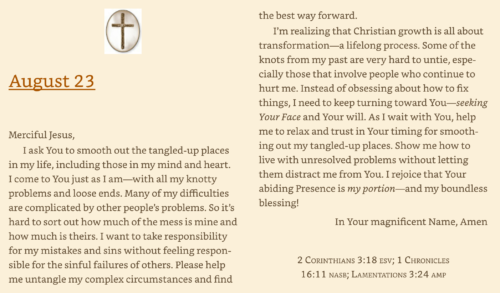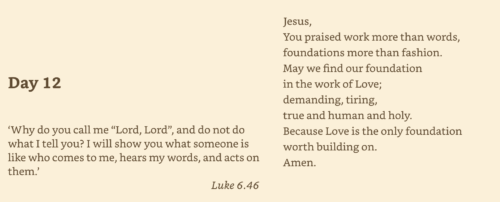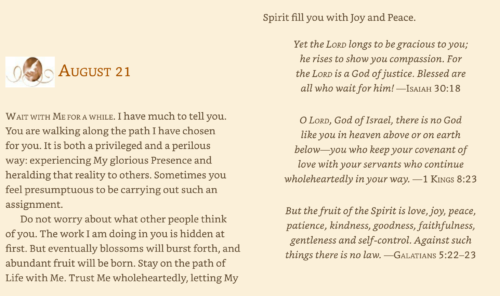For people looking to nurture a contemplative way of life, James Finley counsels “Find your contemplative practice and practice it.”
A contemplative practice is any act, habitually entered into with your whole heart, as a way of awakening, deepening, and sustaining a contemplative experience of the inherent holiness of the present moment. Your practice might be some form of meditation, such as sitting motionless in silence, attentive and awake to the abyss-like nature of each breath. Your practice might be simple, heartfelt prayer, slowly reading the scriptures, gardening, baking bread, writing or reading poetry, drawing or painting, or perhaps running or taking long, slow walks to no place in particular. Your practice may be to be alone, really alone, without any addictive props and diversions. Or your practice may be that of being with that person in whose presence you are called to a deeper place. The critical factor is not so much what the practice is in its externals as the extent to which the practice incarnates an utterly sincere stance of awakening and surrendering to the Godly nature of the present moment.
At any given time we are likely to have not a single practice but rather a constellation of practices, often with one of them as our primary practice. Others may surround it, each carrying its own special place in our life…. As the months and years go by the constellation changes. New practices emerge. Practices that have been present for years fall out of the picture….
We discover by experience that if we are faithful to our contemplative practices our practices faithfully lead us in the direction of a more daily, abiding awareness of the divinity of the life we are living.
Finley stresses the importance of prioritizing intentional presence on a daily basis, while encouraging us to do what we can within the limitations of our lives.
Remaining faithful to our contemplative practices calls for the integrity of remaining faithful to a commitment that nobody sees; it consists of giving ourselves over with all our heart to simple acts which, on the surface, seem to be but the incidental passage of time. But if we are faithful to this unassuming path of fidelity to our daily contemplative practices, the subtle awareness of the depths to which they grant access begins to permeate the very texture of our daily experience of living. Slowly, almost imperceptibly at first, fidelity to our contemplative practices evolves into an habitual awareness that does not miss the surprise appearance of God showing up in something as immediate and simple as the sunlight that suddenly fills a room on a cloudy day.
Finding your contemplative practice is then an event that occurs in each and every granting of contemplative experience in which the divinity of the present moment is realized.… By such fidelities [to practice] you, without your knowing how, are led along the path of your transformation into the depths of divinity that your daily living manifests.
____________________________________________
Sarah Young; Jesus Listens
Jesus, my splendid Companion, I desire to walk with You in close, trusting Love-bonds of joyful dependence. The companionship You offer me sparkles with precious promises from the Bible: You love me with perfect, everlasting Love. You are always with me, each moment of my life. You know everything about me, and You have already paid the penalty for all my sins. My inheritance—kept in heaven for me—can never perish, spoil, or fade. You guide me through my life, and afterward You will take me into Glory! You’ve shown me that dependence is an inescapable part of being human—You designed me to rely on You continually. Help me to view my constant need of You as a blessing. When I accept my dependent condition and stop striving to be self-sufficient, my awareness of Your loving Presence increases. Draw me closer to You, Lord, so I can enjoy Your marvelous Companionship. I delight in Your invitation to walk with You in joyful dependence along the pathway of my life. And I love hearing You whisper: “Beloved, I am with you.” In Your marvelous Name, Amen
JEREMIAH 31:3NJKV; The Lord has appeared of old to me, saying: “Yes, I have loved you with an everlasting love; Therefore with lovingkindness I have drawn you.
EPHESIANS 1:7–8; In him we have redemption through his blood, the forgiveness of sins, in accordance with the riches of God’s grace 8 that he lavished on us. With all wisdom and understanding,
1 PETER 1:3–4; Praise be to the God and Father of our Lord Jesus Christ! In his great mercy he has given us new birth into a living hope through the resurrection of Jesus Christ from the dead, 4 and into an inheritance that can never perish, spoil or fade.
PSALM 73:24; You guide me with your counsel, and afterward you will take me into glory.
Young, Sarah. Jesus Listens (p. 254). Thomas Nelson. Kindle Edition.


